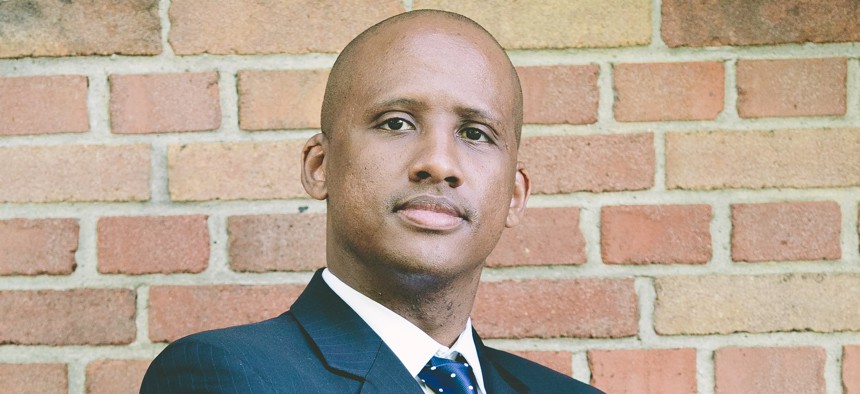Criminal justice
Commentary: I have spent years fighting a wrongful conviction – a struggle known by many
The exoneration process takes far too long and needs streamlining.

LaMon Bland is a New York City-based attorney and founding member of L. D. Bland & Associates. Photo courtesy of L. D. Bland & Associates
I am an attorney. I graduated from Howard Law School in Washington D.C. and passed the New York State Bar in 2009. I then worked as a legislative counsel in the New York City Council General Counsel’s Office. I also worked for the late national strategist Bill Lynch, Jr. before serving as national field director and traveling manager for Reverend Al Sharpton’s National Action Network. I now find myself among the many Americans who have spent years fighting a wrongful conviction.
My ordeal began in the summer of 2018, when several plainclothes investigators from the Manhattan’s District Attorney’s office arrested me as I was entering a court building to file court documents in a civil matter. They applied wrist and ankle restraints then transported me to a holding cell in their headquarters at 1 Hogan Place where they held me for over twenty four hours. Investigators took celebratory photos of me as if I were a prize catch. Initially there was no formal charge to justify the arrest and detention. After over twenty four hours in detention I was charged with a misdemeanor that also had no merit.
After my release, with a family member present, the investigators met me in the lobby, apologized and said they made a mistake. At that point, I thought the nightmare was over. But it was not. Four years later, I am still fighting this criminal conviction despite evidence of a false accusation and a manufactured case against me.
Unfortunately, my case is not unique. Each year the National Registry of Exonerations analyzes and ranks wrongful conviction exonerations by state. For example, in 2018 there were a total of 151 exonerations reported across the United States. Illinois ranked first with 24 exonerations. New York State and Texas tied with 16 each. Of the 151 exonerations, at least 107 cited official misconduct by government officials. That was a record in 2018. Furthermore 111 of the 151 cases involved perjury and false accusations. And 70 out of the 151 exonerations later found no crime had even occurred. Even though a majority of the cases were based on official misconduct the average exoneration ruling still occurs over a decade following the conviction. I am not alone in arguing this is too long and the process needs to be streamlined.
Aside from undermining confidence in the criminal justice system and the associated state and federal civil rights implications, unlawful convictions negatively impact the lives of wrongfully convicted individuals, their families and the communities they reside. It should be noted, collateral consequences resulting from a criminal conviction have serious impacts regardless of whether a convicted individual serves any time incarcerated. Studies show these consequences create social and economic barriers for individuals reentering into society by denying or restricting benefits otherwise available to citizens. Wrongful convictions adversely affect parental rights, housing, welfare, immigration, employment, professional licensure, property rights, mobility, and other opportunities.
I suffered severe collateral consequences prior to the conviction. Four years later, I am still seeking an impartial review. I have sent letters and made calls to everyone in my network to try to resolve this case. My damages range from emotional stress, family separation, reputational damage, loss of business, and missed opportunity for expansion. Based on the current laws I have had to live with the social stigma of being a convicted criminal with little recourse. A criminal conviction, until proven wrongful, prevents individuals from seeking federal relief on Constitutional grounds. Without intervention from governors across the country I, like others similarly situated, are left at the mercy of state conviction review panels like the Manhattan District Attorney’s Conviction Review Bureau.
It is also important to note that my case was built by an office with a well documented history of prosecutorial misconduct. The Central Park Five case is just one of the many highly publicized wrongful conviction cases coming from the D.A.’s office. Several young men and women of color have alleged official misconduct that have fallen on death ears for too long. But we hear them and we stand for an impartial process that returns wrongly convicted persons back to their communities restored of their rights.
My fortune seemed to turn during the COVID-19 shutdown. In 2021, I learned, among other things, the Manhattan D.A. withheld evidence and the bench trial judge’s sentence was unlawful. My attorneys contacted the trial judge and the prosecutor requesting a hearing for a new trial or exoneration. As of this writing I have not received a hearing to review the new evidence.
It should not take five plus years for an exoneration when facts show at the inception that no crime was committed. When state misconduct is at issue, there should be an
impartial process to review cases. I call on Gov. Kathy Hochul to create an impartial process to review cases that involve official misconduct. I am hoping Hochul will intervene as an impartial arbitrator to investigate, expedite a resolution and implement model policies for other states to follow in wrongful conviction cases involving state misconduct. In addition to an exoneration and restorative measures, these policies must provide a mechanism for impartial review of similar wrongful conviction cases in a timely manner. There is an inherent conflict for me to take a grievance to the persons or agencies where evidence shows misconduct. This is a policy issue and state governors are best suited to solve the problem in a timely manner. Hopefully this leads to sweeping change in the justice system.
LaMon Bland is a New York City-based attorney and founding member of L. D. Bland & Associates.
